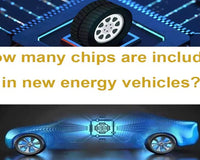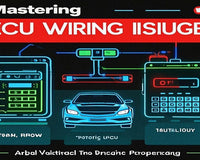ECU is often called the “brain” of the vehicle, which manages everything from fuel injection and ignition timing to emissions control. But like any electronic device, it relies on a stable electrical connection—including a proper ground. What happens if your car’s ECU isn’t earthed correctly?
In automotive field, earthing (or grounding) refers to connecting an electrical component to the car’s metal chassis, which acts as a common return path for electrical current. The ECU, being a sensitive electronic module, needs a clean, low-resistance ground to function. This ground completes the circuit, allowing electricity to flow from the battery through the ECU and back to the battery via the chassis. Without it, the ECU can’t communicate with sensors, actuators, or other systems properly.
How to Identify Earthing Issues in ECU?
Diagnostic Tests.
Intermittent electrical problems, such as the engine runs fine one minute, then stalls the next, A Check Engine Light that comes and goes. Performing diagnostic tests using UT81B multimeter can help pinpoint if the earthing issue is at the root of your vehicle’s electrical problems. A healthy ground should have near-zero resistance; readings above 0.5 ohms indicate a problem.
Visual Inspection.
A simple visual inspection of the ECU and its connections may reveal loose, corroded or improperly installed earth straps or wires, which are often culprits of earthing issues.
Voltage Fluctuation Check.
Using Hantek Digital Oscilloscope to monitoring the voltage fluctuation within the ECU can provide insights into earthing status. Stable voltage readings typically indicate good earthing, whereas fluctuations suggest issues.
What Happens When the ECU Isn’t Earthed?
1. Erratic Engine Performance.
One of the first signs of a poor ECU ground is erratic engine behavior. The ECU relies on precise voltage levels to process data from sensors. A bad ground creates voltage fluctuations, causing the ECU to receive inaccurate readings. Symptoms like random engine stalls disrupt your car’s ability to maintain power, which can cause accidents in traffic.
2. Increased Risk of Electrical Shocks.
A vehicle with an inadequately earthed ECU presents a real danger of electrical shocks. Electrical shocks can occur unexpectedly when touching parts that normally would not carry a live current, if properly earthed.
3. Interference in Electronic Communication.
A non-earthed ECU can introduce significant interference in the communication between various electronic systems within the vehicle. Such interference can corrupt the data being transmitted between components, leading to erroneous outputs and diagnostic errors. 
4. Electrical System Damage.
A missing or weak ground doesn’t just affect the ECU—it can damage other electrical components. When the ECU can’t find a proper return path, electricity may “seek” alternative routes through other wires or components, a phenomenon known as “ground looping.” This can cause overvoltage Spikes, unregulated current may surge through sensitive parts like the alternator, battery, or even the ECU itself, frying circuits or blowing fuses.
5. Reduced Lifespan of the ECU.
Consistent exposure to unstable currents and potential overheating due to poor earthing significantly shortens the lifespan of the ECU. The stress and strain on the circuitry from fluctuating power levels can lead to premature wear and tear. This not only increases the likelihood of failure during operation but also results in costly replacements and repairs. 
Car ECU’s ground may seem like a small detail, but it’s critical to your car’s performance, safety, and longevity. If you discover that your ECU is not properly earthed, taking immediate and informed action can prevent further damage and ensure the longevity of your vehicle’s electronic systems. After all, keeping the “brain” of your car properly grounded ensures it can keep your engine running smoothly for miles to come.
What Happens When Your Car’s ECU Isn’t Properly Earthed?










